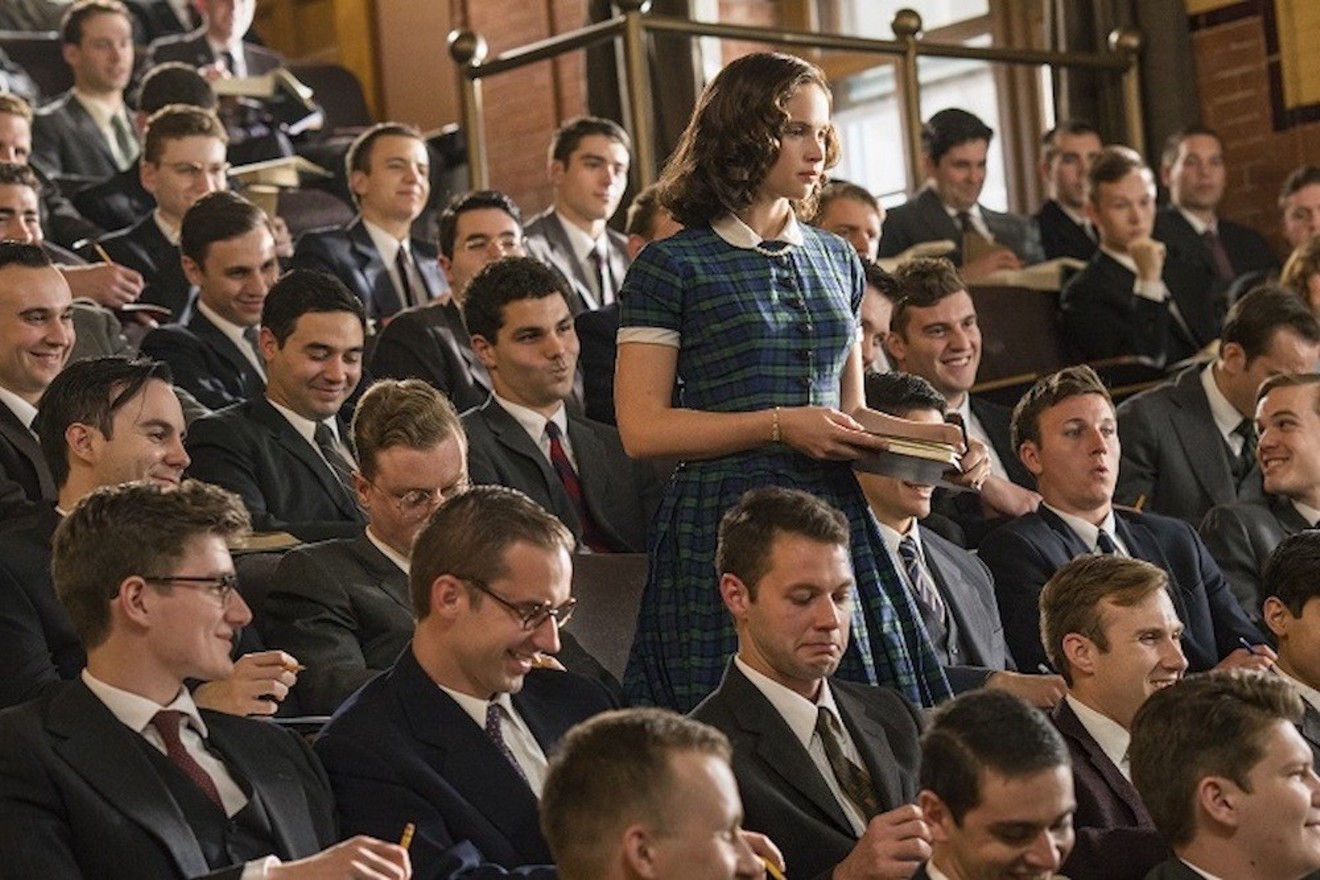But where does one start to change the world? A sort of legal-procedural-slash-superhero origin story, Mimi Leder’s cheery new Ruth Bader Ginsburg drama On the Basis of Sex makes the case for persistence over the course of a life, for fighting off complacency, for taking inspiration rather than umbrage in the outrage of people younger than you. Leder’s film mostly devotes itself to the future Supreme Court justice’s first world-shaking sex discrimination case, 1972’s Moritz v. Commissioner of Internal Revenue: Ginsburg and her husband, tax lawyer Martin D. Ginsburg, argued against a discriminatory statute before the 10th Circuit Court of Appeals. Leder smartly balances the personal and the political, the intimate and the public, the myth of the liberal folk hero and the facts of the case itself. Those facts aren’t gripping in their own right — a Colorado bachelor was denied a tax credit for hiring a caretaker for his aging mother, a tax credit that a woman would have received — but that’s one of Leder and Ginsburg’s points: Changing the world takes a shrewd attention to detail.
The film opens with young Ginsburg (Felicity Jones), recently married, arriving at Harvard Law School as a student in 1956. She is one of just nine women in a class of hundreds, a point Leder persuasively establishes in a kickoff montage: all these swells in black suits, parading up Cambridge’s most pompous staircase, and also one tiny woman in a baby-blue skirt set. Crusty ol’ Dean Erwin Griswold (Sam Waterston) invites these interlopers to a private dinner where he demands they justify themselves. Why, he asks, did they each insist on matriculating, denying a man his place in the class?
RBG’s answer is a crowd-pleasing jolt, an early sign that Leder won’t shy away from the print-the-legend mode. But the scene, like that montage, is unsettling, crafted to dig at all the many ways the women are told that their ambition might ultimately be more trouble than it's worth, and the actors invest in it with convincing in-the-moment emotion. Leder’s film never lets us forget that it’s a feel-good Hollywood fantasy “inspired” by real life, but there’s a heart thumping beneath the gloss, with some fire in its blood — and some hurt, too. Unlike Green Book, On the Basis of Sex never suggests that the discrimination its real-life subject faced is a relic of the American. The sexism of Harvard in the Dwight D. Eisenhower years might be more bald than today’s variety, but nobody who has spent time among men with power today will be surprised by the annoyed dismissiveness that we see and hear from Waterston’s Griswold.
Leder moves briskly through those early years, introducing the Ginsburg marriage — her husband, played by Armie Hammer, was a year above her at Harvard Law — and tracking her move to Columbia University and subsequent professorship there, after law firms just couldn’t bring themselves to hire a female lawyer. In some quick, smart scenes, Leder and her cast establish the joy Ginsburg finds in teaching in the Vietnam era, inspiring future female lawyers in a class about the then-novel concept of sexual discrimination. But we also see in Jones’ careful, moving performance her discontentment: The professor wanted to change things now, not just train the members of a generation who would do it later. Meanwhile, her young teen daughter jabs at her, noting that the woman fighting for women’s rights in the academy rather than the streets sure likes to dress up pretty for her husband’s parties. The strapping Hammer proves pleasantly agreeable in the support role, though he seems cast partially to emphasize the real Ruth Bader Ginsburg’s shortness. Leder’s attentiveness to RBG’s diminutiveness is somewhat refreshing since studio movies always pretend stars are just about the same height, with the men just a couple of inches taller. Here, standing together, Jones and Hammer look a little like hobbit and human.
Eventually, Martin D. Ginsburg reads about a ruling against Charles E. Moritz for tax evasion. Both he and Ruth see opportunity: By appealing the case, arguing that it’s discriminatory to deny a man a tax credit simply because he’s not a woman, they could convince the courts that any sex discrimination violated the Fifth Amendment’s promise of equal protection. From there, Leder offers us a crisp, involving legal thriller, with tense preps for oral argument, impassioned debates about language and strategy, and salty appearances from lefty legal stalwarts like Dorothy Kenyon (Kathy Bates) and the ACLU’s Mel Wulf (Justin Theroux). It all builds, of course, to a moment of rousing ridiculousness, as the once-and-future RBG fumbles with a microphone while standing before a panel of judges, setting off a squall of feedback, and then stammering too much as she begins her remarks. Will she find her voice? Will she change the world? Reader, just guess. What is exciting in On the Basis of Sex isn’t the technique or its surprises. It’s that the once radical ideas Ginsburg fought (and fights) for now can be rendered onscreen as commonsensical in a film with plotting and structure that are so proudly, deeply ordinary. It’s RBG as Jimmy Stewart.
[
{
"name": "Air - MediumRectangle - Inline Content - Mobile Display Size",
"component": "18478561",
"insertPoint": "2",
"requiredCountToDisplay": "2"
},{
"name": "Editor Picks",
"component": "16759093",
"insertPoint": "4",
"requiredCountToDisplay": "1"
},{
"name": "Inline Links",
"component": "17980324",
"insertPoint": "8th",
"startingPoint": 8,
"requiredCountToDisplay": "7",
"maxInsertions": 25
},{
"name": "Air - MediumRectangle - Combo - Inline Content",
"component": "16759092",
"insertPoint": "8th",
"startingPoint": 8,
"requiredCountToDisplay": "7",
"maxInsertions": 25
},{
"name": "Inline Links",
"component": "17980324",
"insertPoint": "8th",
"startingPoint": 12,
"requiredCountToDisplay": "11",
"maxInsertions": 24
},{
"name": "Air - Leaderboard Tower - Combo - Inline Content",
"component": "16759094",
"insertPoint": "8th",
"startingPoint": 12,
"requiredCountToDisplay": "11",
"maxInsertions": 24
}
]












